Caste splits Tamils over bullfighting
- Published
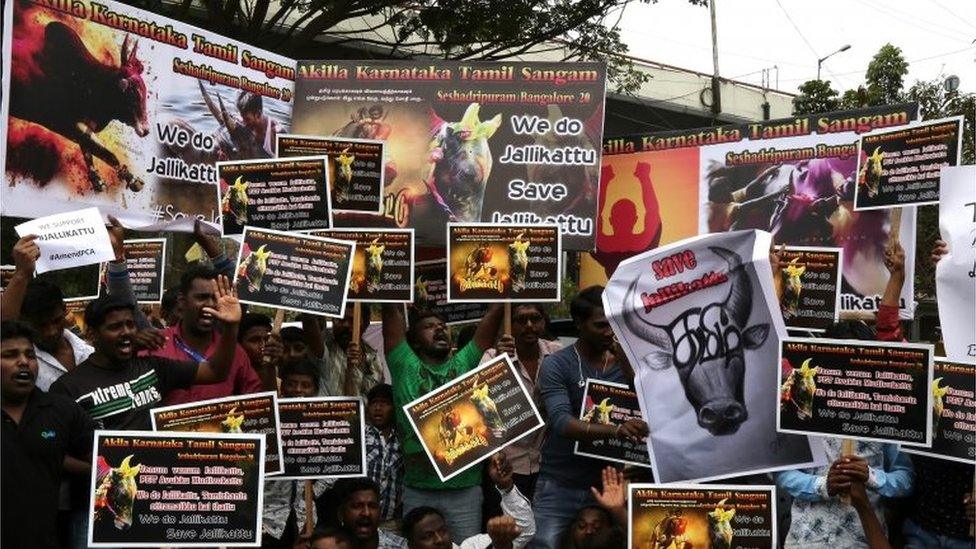
Thousands protested in support of bullfighting in Tamil Nadu in January
Many people in India's Tamil Nadu state have celebrated the return of traditional bull-taming contests after a court ban was overturned. But Dalits (formerly called untouchables) say they are still prevented from taking part in the sport, sometimes violently.
A temple dedicated to a deity stands at the entrance to Jeeva Nagar Dalit colony in Kallapur, a village some 60km (37 miles) north of Madurai.
The temple is surrounded by trophies and shields won by the Dalit team in the contact sport of kabaddi. Dozens of medals - some faded by the weather - hang there too, testament to local sporting prowess.
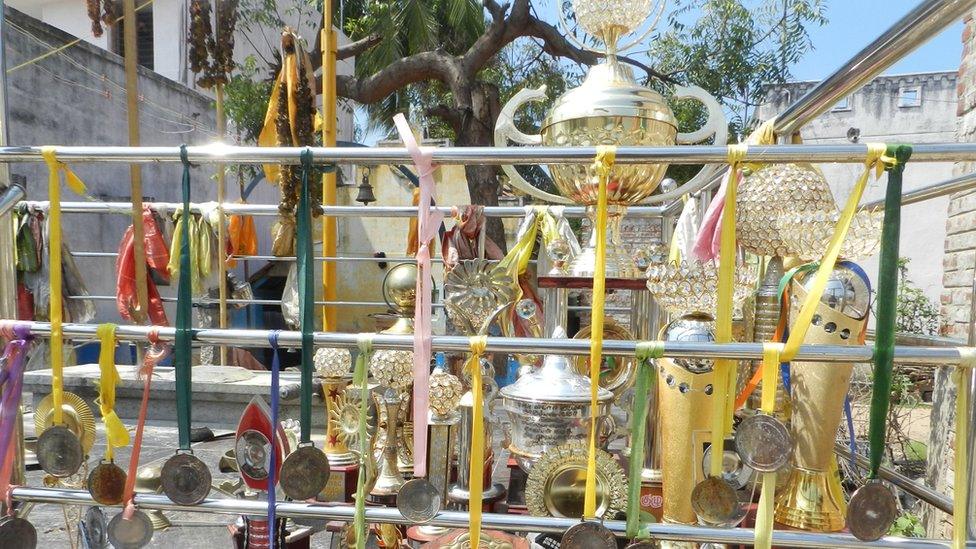
The temple in Jeeva Nagar is bedecked with sporting trophies and medals
"All these were won by our boys in the last three years. Older cups and shields were removed some time back to create space," says Alaggu, a community elder.
Jeeva Nagar, has even produced a state-level kabaddi player. But bullfights, known as jallikattu, are a strict no-go area for the Dalits.
"Some 40 years ago youths from this village used to take part in jallikattu. But whenever our youngsters tamed the bulls of caste Hindus we suffered a violent backlash.
"So, in the early 1990s our village elders decided not to participate in the sport. But we continue to be spectators," Alaggu says.
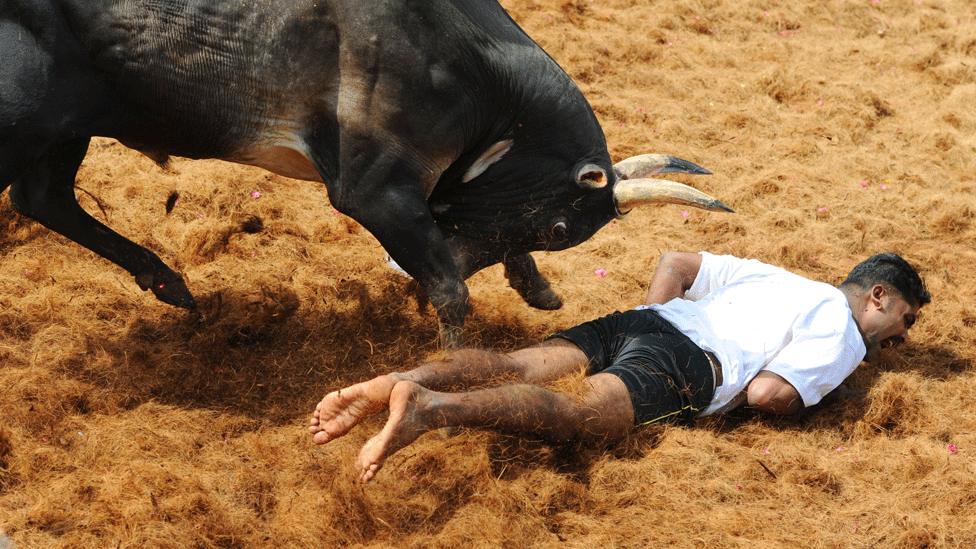
Activists say jallikattu is cruel to bulls - it's also dangerous for the men

Read more about Tamil Nadu and bullfighting:
That decision, however, has not saved them from violence.
Kumar, 48, is homeless and has no source of income. On 15 January, he was beaten by unknown assailants who barged into Jeeva Nagar shouting caste slurs.
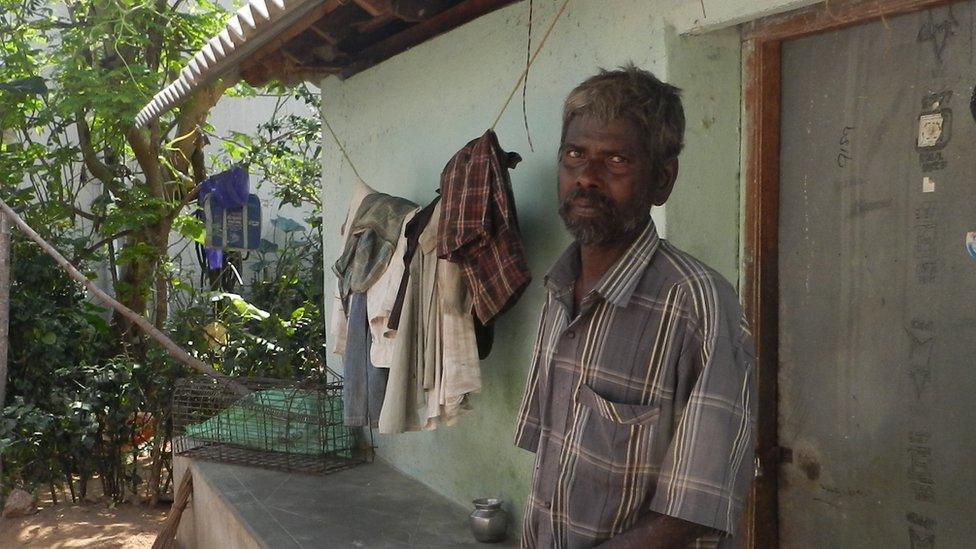
Kumar says he was beaten by members of higher castes
"My hip and knee joints are dislocated. I can walk only with the help of this stick. I was admitted to the government hospital where they did not even give me an injection. I don't know how long I am going to be like this," he says.
Initially, he had no idea why he had been attacked. But later he came to know the reason.
"It seems caste Hindus were organising a jallikattu festival in our village. On the sidelines of the event an argument seems to have erupted between Dalit youths and caste Hindus which was followed by violent attacks," Kumar says.
Many local landowners may be below the upper castes in the Hindu system, but they are politically powerful because of their numbers - and Dalits, at the bottom of the caste hierarchy, work on their farms.
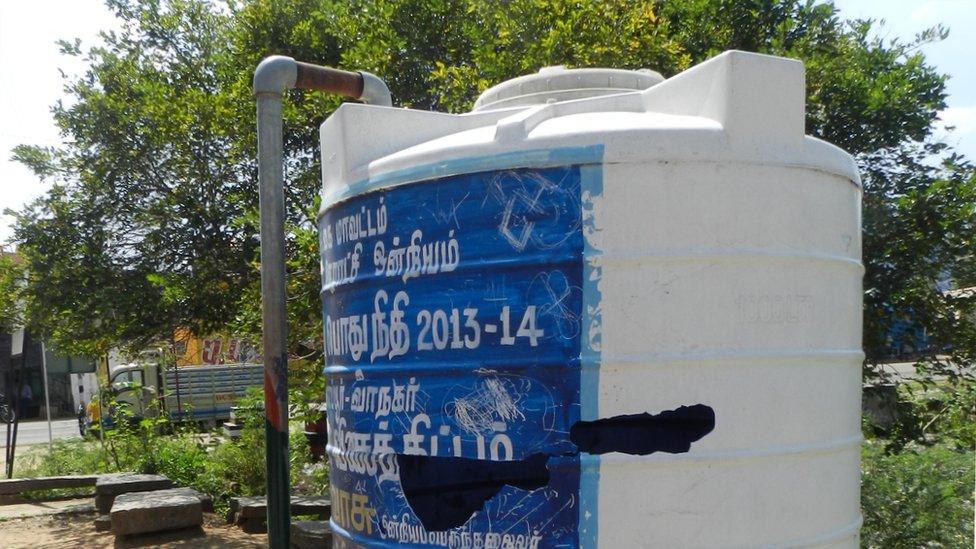
The Dalits' water tank was damaged in the attack
Like so many villages in Tamil Nadu, Kallapur is divided into two parts - with a clear physical separation between Dalits and non-Dalits. A road divides Jeeva Nagar's 200 families from the rest of the village.
Rekha, a 36-year-old mother, was hiding inside her house when the neighbourhood was ransacked.
"They used abusive language and burnt a few motorbikes. They punctured our water tank and attacked whoever they could find with sticks. But the real issue is not jallikattu. They used it as an excuse to attack us. Caste Hindus are jealous of the upward mobility of Dalits."
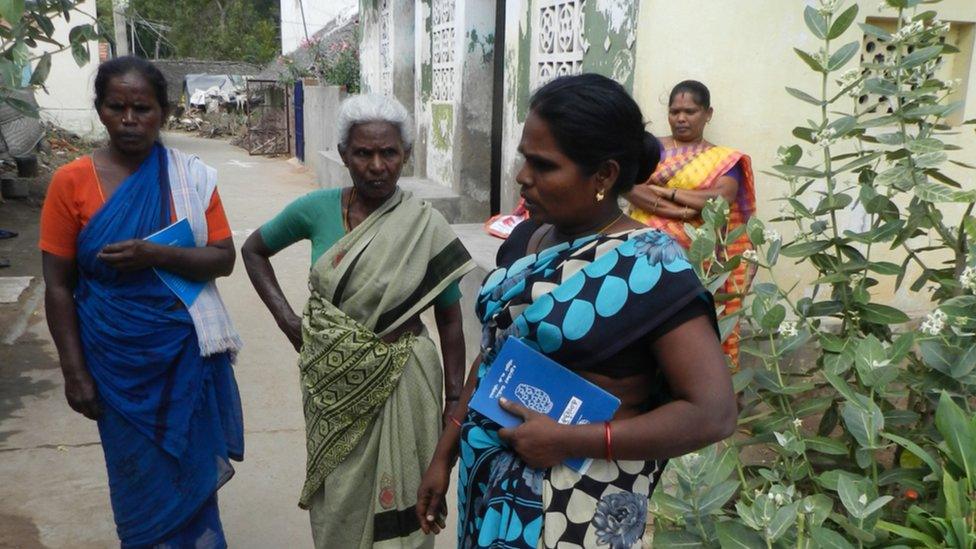
Rekha, nearest (holding book), and other Dalits are separated from the rest of the village
Jallikattu contests have been popular for centuries. But the Supreme Court banned them in 2014 after objections from animal rights groups.
Mass protests across Tamil Nadu in January led to the state government bringing in a new law to nullify the judicial ban.
The sport is now being played with renewed enthusiasm in southern districts of the state. But analysts say the caste divide, as in other social matters, is reflected in jallikattu.
The sport's supporters say it is an important part of Tamil culture. It is heavily patronised by the powerful "Kallar caste", to which chief minister-elect VK Sasikala belongs.
Other landowning intermediate caste groups also enthusiastically participate, many of them bull owners and bull tamers.
But very few Dalits take part. Kallars and Dalits have been adversaries for a long time.
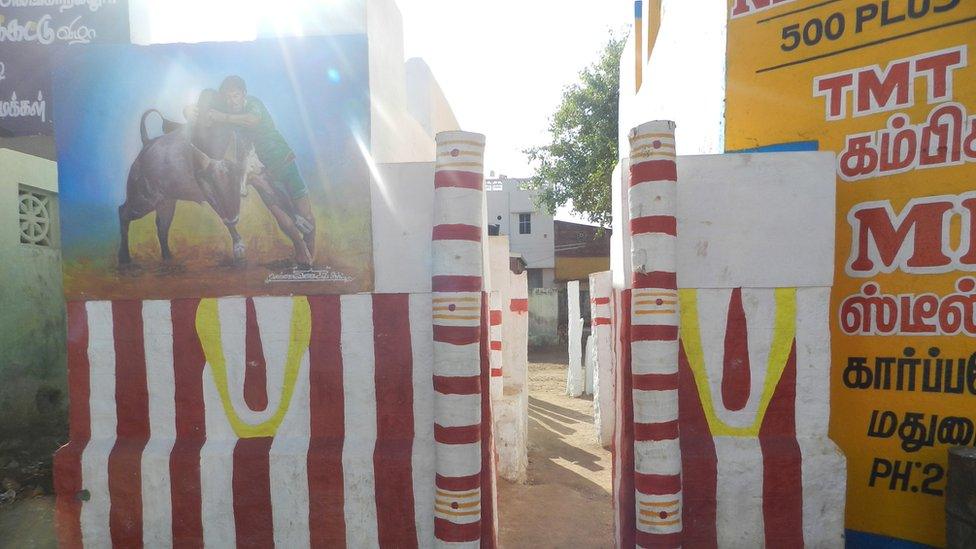
Dalits are in a majority in Alanganallur and take part in bullfights there
Dalit intellectuals see jallikattu as a tool used by dominant castes to maintain their control.
"In the 1980s and 1990s, jallikattu events triggered violent caste clashes in many villages in which Dalits suffered heavy losses," says Madurai-based Professor Stalin Rajangam, who has studied jallikattu-related caste violence extensively in Tamil Nadu.
"There were even cases of Dalits being murdered in a few places. Due to violence, many Dalit settlements like the one in Kallapur decided to move away from the sport."
Tamil Nadu's jallikattu federation dismisses claims of caste based discriminations in the sport.
"Anyone can bring in a bull to the game. In the same manner, any able-bodied man can tame the bull. Before the event we check the health of the bull, and the bull tamers. No one asks for caste certificates," says Dr P Rajasekaran, leader of the federation.
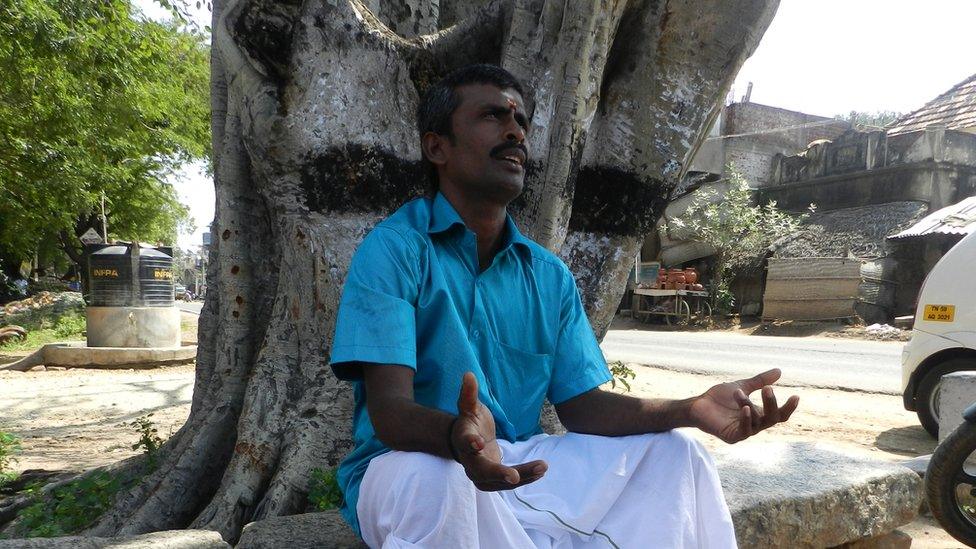
Nagaraj would love to try his hand at jallikattu
"Jallikattu always starts with prayer. In some places Dalits are the presiding priests of village temples. In those places they are given the customary honours. This has been the tradition all along."
But Prof Rajangam says this is only partly true.
"There is a symbolic presence of Dalits in Madurai-based jallikattu events, because they are organised by the government and in some places like Alanganallur where Dalits are in the majority.
"But this is not the case in a number of small villages, where Dalits are not allowed to participate or are asked not to tame the bulls of the caste Hindus."
Back in Jeeva Nagar, it's not hard to find Dalits keen to participate in the sport.
"I always wanted to be a bull tamer," says 38-year-old Nagaraj.
"Before jumping into the arena I need practice. For that I need access to a bull. But no one from my community has one," he says.
"Caste Hindus living in this village have bulls. But I never approached them because I know how they will react."
Nagaraj says he watches jallikattu on TV and dreams of the day when Dalits will be able to compete as equals.
- Published21 January 2017
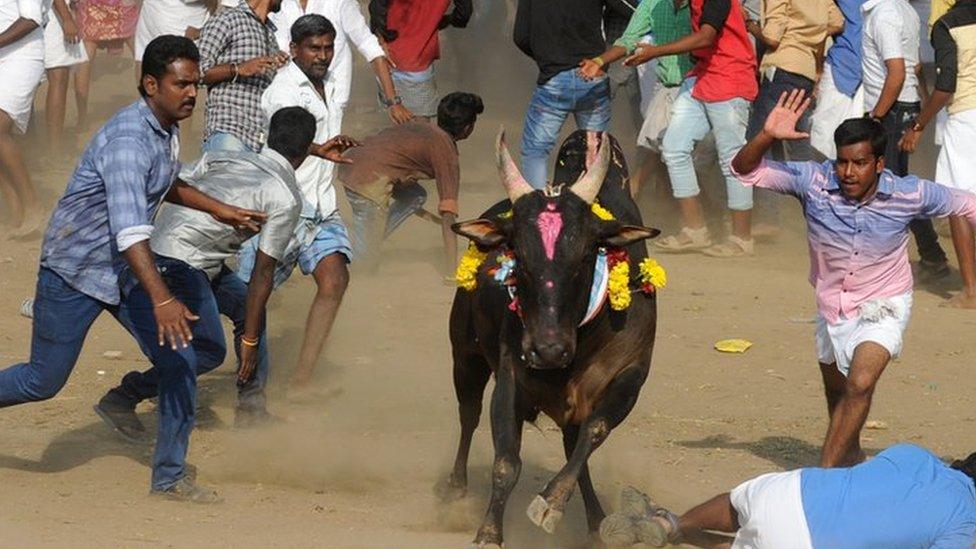
- Published7 January 2016
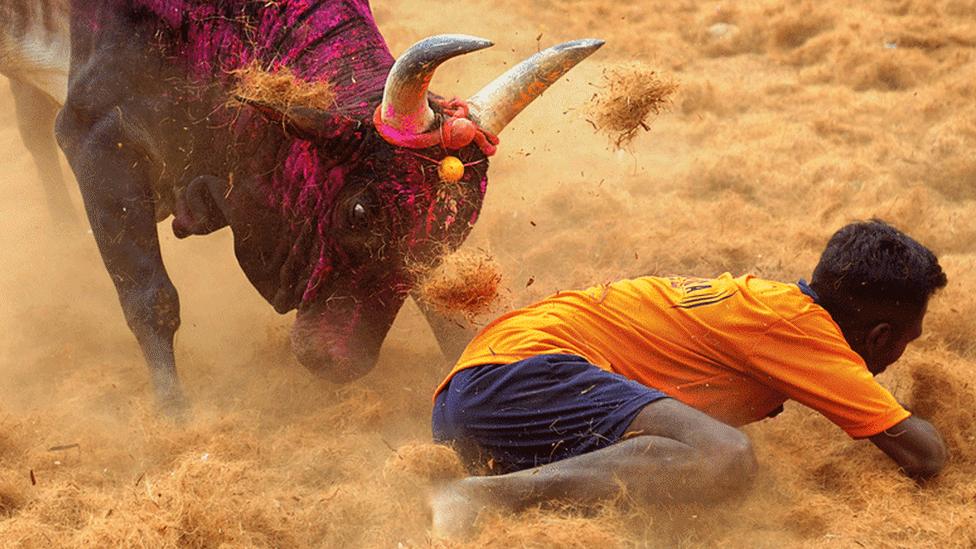
- Published21 January 2017